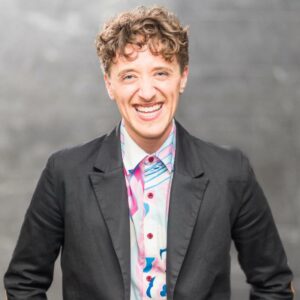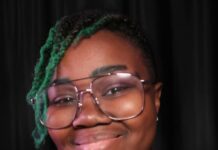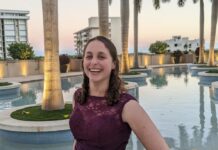
Ellen Braunstein
Lex Pe’er Horwitz, who identifies as transgender, played varsity men’s squash at Bowdoin College in Maine. It wasn’t his first squash team at the private liberal arts school in Maine.
Horwitz, who alternately uses binary and nonbinary gender pronouns, had switched from the women’s team to a place where he found greater affirmation and acceptance.
In his first job out of college, where he majored in gender sexuality and women’s studies, he became a special ed teacher and case manager. Horwitz said he experienced repeated incidents of antisemitism, transphobia and homophobia in the teaching job.
Those experiences deeply affected Horwitz and he would make it his mission to help create more supportive and affirming places for LGBTQ+ individuals. “My experiences in athletics and social services led me to this role,” said Horwitz, 27.
He is now a consultant, public speaker, researcher, workshop facilitator, curriculum creator for educational institutions, nonprofits, medical centers and businesses in Philadelphia and beyond. He also coaches squash in local schools.
Horwitz, who lives in South Philadelphia, specifically identifies as a “queer, non-binary transgender Jewish human.”
Of his women’s squash experience, Horwitz said, “Language was not creating a space where I was reflected or being heard. It’s difficult for me to use a women’s locker room when walking into that space was not affirming and felt very invalidating to my identities.”
Horwitz pairs a lived experience with an academic background to engage with the community to promote LGBTQ+ rights and awareness and best support the queer community.
“That experience guided a lot of the work that I do today. It was at school that I was finally able to exist and live and be my authentic self,” said Horwitz, who was the first out athlete in Bowdoin and the first out college squash player. “That took having access to language that showed identity as expansive and more than binary, where it was safe to be nonbinary, trans and queer.”
After experiencing discrimination “where I no longer felt mentally, emotionally or physically safe in those spaces, I chose to leave that job and find a way to advocate and educate for the queer and trans community, to be able to work to combat what I had experienced in those settings.”
Among his clients are the School District of Philadelphia, the Institute of Contemporary Art in Philadelphia, the American College of Physicians and Temple Health and the Human Rights Campaign.
The topics he focuses on center are gender and sexuality, intersectionality and community support.
Another one of his workshops concerns self-advocacy and a third is about the athlete experience called Trans and Athletics Inclusion.
“We break down the debate on inclusion and trans athletes and look at the misinformation that is fueling fear and the hatred of trans athletes,” he said.
“What we’re seeing is not only transphobia but also sexism, misogyny, racism and ableism,” he said.
Ableism is the discrimination of and social prejudice against people with disabilities based on the belief that typical abilities are superior.
Horwitz said his Judaism intersects with the LGBTQ+ work. “I grew up Jewish, and I’m spiritually connected to my Jewish identity.”
In his youth, he attended services every weekend and had a b’nai mitzvah with his sister at Beth Tikvah-B’nai Jeshurun in Glenside.
“My Jewish identity is at the center and core of who I am and who I know myself to be.”
Horwitz said his Jewish identity is “centered on tikkun olam and tzedakah, the values and those teachings that I grew up learning at home and at my synagogue.
“That’s not only my responsibility, but it’s a gift to be able to live life in that way and to support others and our world,” he said.
Horwitz participated last year as a fellow in Tribe 12, an organization for entrepreneurial Philadelphia Jews in their 20s and 30s. He occasionally attends synagogue at Kol Tzedek, a Reconstructionist congregation in West Philadelphia.
The political climate and environment are threatening to the LGBTQ+ community, particularly nonbinary transgender people.
Horwitz said that if one follows politics, it’s obvious that legislation is being passed “that primarily targets nonbinary and transgender folks.
“It’s much easier for us to all come together and to honor and cherish our differences and the diversity that is human existence and be able to uplift one another in that capacity versus create these divides,” Horwitz said.
He said there’s a systematic attack on the LGBTQ+ community.
“We are still fighting for overall equality and equity,” he said. “Every single realm that exists whether it’s schools, curriculum, housing, health care, education, access, job stability, every single area has much more work to be done to create spaces where members of the LGBTQ+ community are not only surviving but thriving.”
Horwitz recommends that everyone look at what is happening in their school, city, district and state.
“What are the ways in which you can advocate for inclusive policy, that you can create affinity or other types of group spaces for folks to be able to exist in community together?
Use your power and your potentially different privileges to be able to advocate and support nonbinary, trans and queer folks,” he said.
“My biggest gift is to have folks feel seen and represented and heard and validated in hearing my story to know that they, too, can have this amazing and meaningful life and path ahead of them.”
Ellen Braunstein is a freelance writer.






